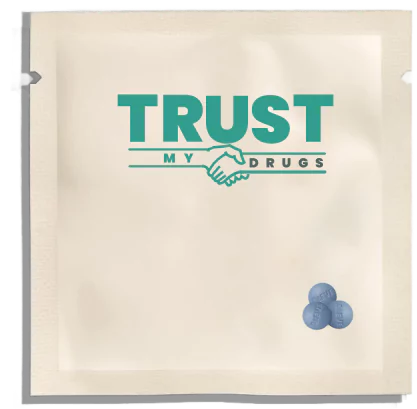Generic Aleve meets the strict standards of the FDA for safety, quality, and effectiveness. So you can trust its performance. While all NSAIDs can irritate the stomach lining, Generic Aleve is less harsh than alternatives like ibuprofen when taken with food. It is suitable for short-term and chronic use (under medical supervision), making it versatile for addressing multiple conditions. The 60mg dosage is a lower-strength option, potentially suitable for people who require a more conservative dose to manage symptoms effectively.
What is Generic Aleve 60mg?
Generic Aleve (naproxen sodium) works by blocking certain chemical messengers in the body, which triggers the sensation of pain, inflammation, and fever.
Targets Inflammation and Pain
Naproxen sodium is a nonsteroidal anti-inflammatory drug (NSAID). It works by inhibiting the enzyme cyclooxygenase (COX). COX enzymes (COX-1 and COX-2) are involved in producing prostaglandins, which are chemicals that cause inflammation, pain, and swelling in the body. By blocking COX enzymes, Generic Aleve reduces the production of prostaglandins, helping to relieve pain and reduce inflammation.
Reduces Fever
Prostaglandins also play a role in raising your body’s temperature during illness.
By lowering prostaglandin levels, naproxen sodium helps reduce fever and restore normal body temperature.
Provides Long-Lasting Relief
The body absorbs Naproxen sodium into your bloodstream and starts working within 30–60 minutes. It has a relatively long half-life compared to some other NSAIDs, meaning it provides relief for up to 8–12 hours with just one dose.
Why Does It Work for So Many Conditions?
Generic Aleve addresses the root causes of many common issues (pain, inflammation, fever) by tackling prostaglandins.
Take it for:
- Arthritis pain (reduces joint swelling and stiffness)
- Headaches (blocks pain signals)
- Muscle pain (reduces inflammation)
- Menstrual cramps (relaxes uterine muscles and lowers inflammation)
What are the Uses and Benefits of Generic Aleve 60mg?
Uses of Generic Aleve 60mg
Multiple conditions moderate-to-severe Pain Relief
- Headaches (including tension headaches)
- Toothaches
- Back pain and sciatica
- Muscle pain (e.g., sprains or strains)
- Menstrual cramps (dysmenorrhea)
- Chronic Conditions
- Arthritis (osteoarthritis, rheumatoid arthritis): Reduces joint pain, swelling, and stiffness.
- Gout: Relieves pain and inflammation during flare-ups.
- Ankylosing spondylitis: Manages inflammation and stiffness in the spine.
- Fever Reduction: Helps lower fever caused by infections, colds, or flu.
- Post-Surgery or Injury Pain: Alleviates pain and swelling after minor surgeries or injuries.
Benefits of Generic Aleve 60mg
Fast and Effective
It works within 30–60 minutes to relieve pain and reduce inflammation.
Long-Lasting Relief
It provides 8–12 hours of relief, meaning fewer doses than other pain relievers like ibuprofen.
Anti-Inflammatory Properties
It reduces swelling and inflammation. It is ideal for injuries and chronic inflammatory conditions.
Non-Drowsy Option
Unlike some pain relievers, Generic Aleve will not make you drowsy, allowing you to continue your daily activities.
Affordable and Accessible
Generic versions are significantly less expensive than brand-name and as effective and budget-friendly.
Multi-Purpose
One medication can treat multiple conditions, from headaches to arthritis.
FDA Approved
Ensures safety, efficacy, and high-quality manufacturing.
What are the Safe Dosages of Generic Aleve 60mg?
Recommended Adult Dose
Pain Relief (e.g., headache, muscle pain, back pain, menstrual cramps)
Initial Dose
220–440 mg (typically 1–2 tablets of 220 mg).
Maintenance Dose
220 mg every 8–12 hours as needed.
Maximum Dose
Take a maximum of 660 mg in 24 hours (3 tablets of 220 mg).
Arthritis or Chronic Conditions
Initial Dose: 220–440 mg twice daily (every 12 hours).
Maintenance Dose: Doctors adjust the dose based on symptoms, up to 660 mg/day.
For long-term use, consult a doctor to avoid side effects like stomach irritation.
Fever Reduction
Initial Dose: 220 mg every 8–12 hours.
Maximum Dose: 660 mg in 24 hours.
Chronic Conditions (e.g., arthritis)
Rheumatoid Arthritis or Osteoarthritis
The typical maintenance dose is one tablet (60mg) every 8–12 hours.
For Gout Flares
Take two tablets (120mg) initially, followed by one tablet (60mg) every 8 hours until symptoms improve.
For Menstrual Cramps
Take two tablets (120mg) at the onset of cramps, then one tablet (60mg) every 8–12 hours as needed.
For children 12 years and older
1 tablet (60mg) every 8–12 hours. Do not exceed three tablets (180mg) in 24 hours unless directed by a doctor. Not for children under 12 years old unless prescribed by a doctor.
Older Patients
They may require lower doses because of an increased risk of stomach irritation or kidney issues.
People with Pre-existing conditions (e.g., kidney disease, heart problems):
They may require reduced doses or alternative medications to avoid complications.
Key Points to Remember
Always take Generic Aleve with food or milk to reduce stomach irritation. Use the lowest effective dose for the shortest duration necessary to minimize side effects. Avoid taking more than the maximum dose in 24 hours. To reduce the risk of stomach upset, take Generic Aleve with food or milk. Avoid exceeding the daily limit (180mg for adults). Overdosing can increase the risk of serious side effects, such as stomach ulcers, kidney problems, or heart issues. For chronic use (e.g., arthritis), consult a doctor to determine the lowest effective dose for extended safety.
How to take Generic Aleve 60mg?
Follow the Correct Dosage. Read the Label: Always follow the dosage instructions on the package or as your doctor prescribes. Swallow the tablet whole with water to ensure proper absorption. Do Not Crush or Chew the Tablets. Take one tablet (220mg) every 8–12 hours or as needed. You may take two tablets (440mg) for the first dose for severe pain. Do not exceed three tablets (660mg) in 24 hours. Take It with food or milk because taking naproxen with food, milk, or a full glass of water (8 oz.) helps reduce the risk of stomach upset or irritation. Avoid Lying Down Immediately After Taking It. Wait 10–15 minutes before lying down to prevent the medication from irritating your esophagus. Take at the Same Time Every Day (for Chronic Conditions). If you are using Generic Aleve for ongoing conditions like arthritis, take it at the scheduled time daily to ensure consistent levels in your body. Use for the Shortest Time Necessary. Stay Hydrated. Naproxen can put extra strain on your kidneys, especially with long-term use. Drink plenty of water to stay hydrated.
For pain relief or fever: Use for no longer than 10 days unless directed by a doctor.
For chronic conditions: Long-term use should only be under medical supervision.
Avoid Alcohol: Alcohol increases the risk of stomach bleeding or irritation when taking NSAIDs like naproxen.
Be Cautious with Other Medications
Avoid Other NSAIDs: Do not take Generic Aleve with other NSAIDs like ibuprofen, aspirin, or celecoxib.
Blood Thinners or antidepressants: Check with your doctor, as naproxen can increase the risk of bleeding.
When Should I Avoid Generic Aleve 60mg or Use Generic Aleve 60mg Cautiously?
Avoid Generic Aleve 60mg If:
You Have a History of Allergies to NSAIDs
If you have had an allergic reaction to naproxen, ibuprofen, aspirin, or other NSAIDs (e.g., swelling, hives, breathing difficulty), avoid using it.
You Have Active Stomach or Intestinal Issues
Conditions such as stomach ulcers, bleeding in the stomach, or severe acid reflux can worsen with NSAID use.
You Have Severe Kidney Disease
Naproxen can impair kidney function, especially in those with pre-existing kidney problems.
You Have Severe Liver Disease
Your liver processes the drug; impaired liver function may increase the risk of side effects.
You Are in the Third Trimester of Pregnancy
NSAIDs like naproxen may cause complications, such as premature closure of the ductus arteriosus in the baby. Avoid during the last trimester.
You Are Breastfeeding
Naproxen can pass into breast milk and potentially harm a nursing baby.
You are Taking Other NSAIDs or Aspirin Regularly
Using multiple NSAIDs together increases the risk of serious side effects like stomach bleeding or kidney damage.
Use Generic Aleve 60mg Cautiously If:
You Have Cardiovascular Issues
Conditions like high blood pressure, heart disease, or a history of stroke:
Naproxen may increase the risk of heart attack or stroke, especially with long-term use.
Have a Bleeding Disorder or Are Taking Blood Thinners
Naproxen may increase the risk of bleeding if you take warfarin, aspirin, or other anticoagulants.
You Are above 65
Older adults are more prone to stomach irritation, bleeding, and kidney issues. Use the lowest effective dose for the shortest duration.
You Have Asthma
Some people with asthma experience worsened symptoms or an asthma attack from NSAIDs (aspirin-sensitive asthma).
Dehydrated
Naproxen can increase strain on the kidneys. The condition may exacerbate when the body dehydrates.
What are the Side effects of Generic Aleve 60mg?
Common Generic Aleve 60mg Side Effects
- Heartburn
- Stomach pain or discomfort
- Nausea
- Constipation or diarrhea
- Gas or bloating
- Dizziness
- Drowsiness
- Headache
- Mild rash or itching
- Increased blood pressure (may occur in some people with pre-existing hypertension)
- Swelling in the hands, feet, or ankles (fluid retention)
Severe Generic Aleve 60mg Side Effects
- Stomach bleeding or ulcers
- Heart attack or stroke
- Acute kidney failure
- Liver issues
- Anaphylaxis (life-threatening allergic reaction)
- Persistent headaches or confusion
- Anemia (low red blood cell count)
- Edema (swelling in the hands, feet, or ankles)





